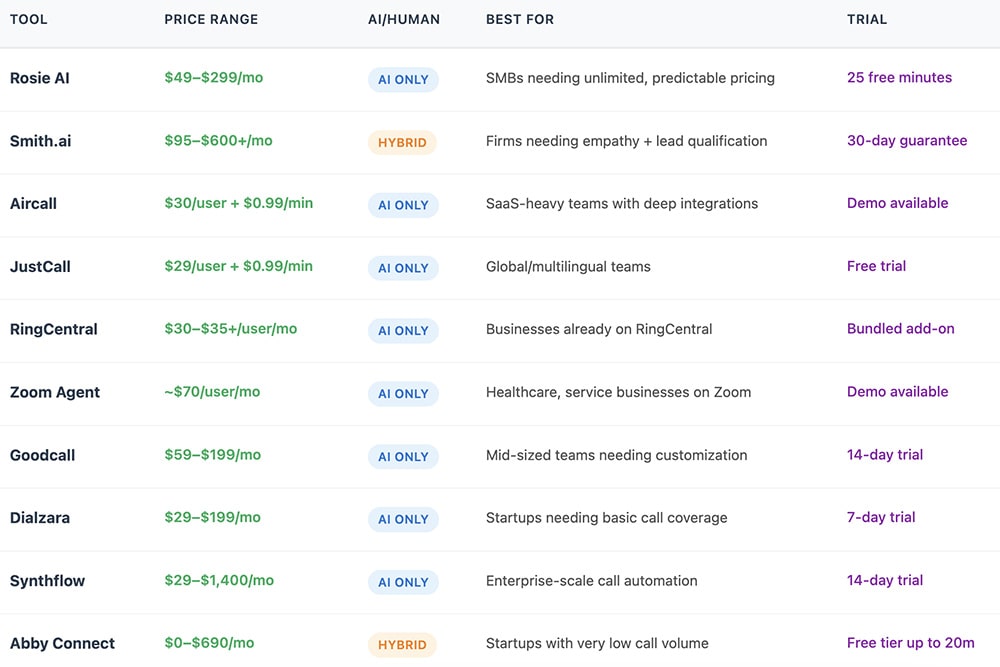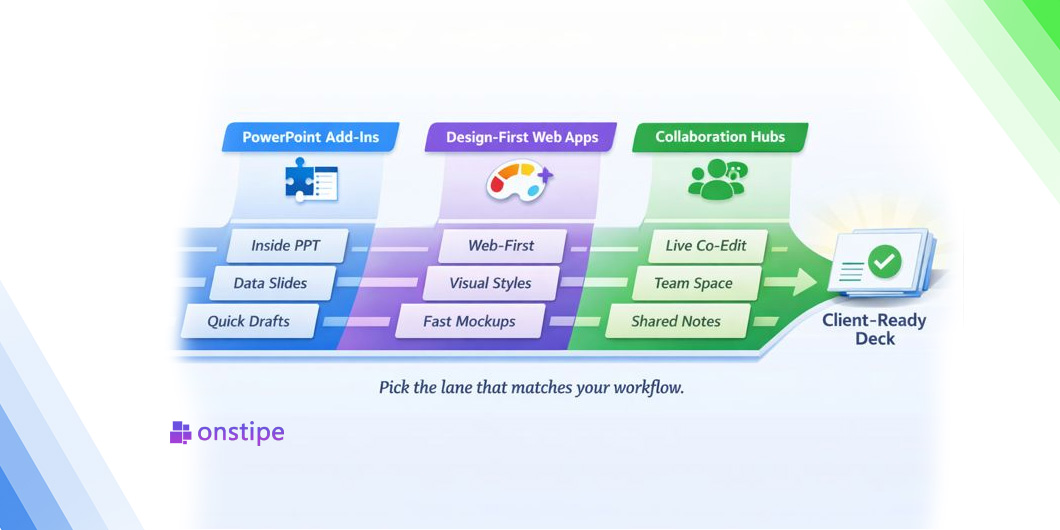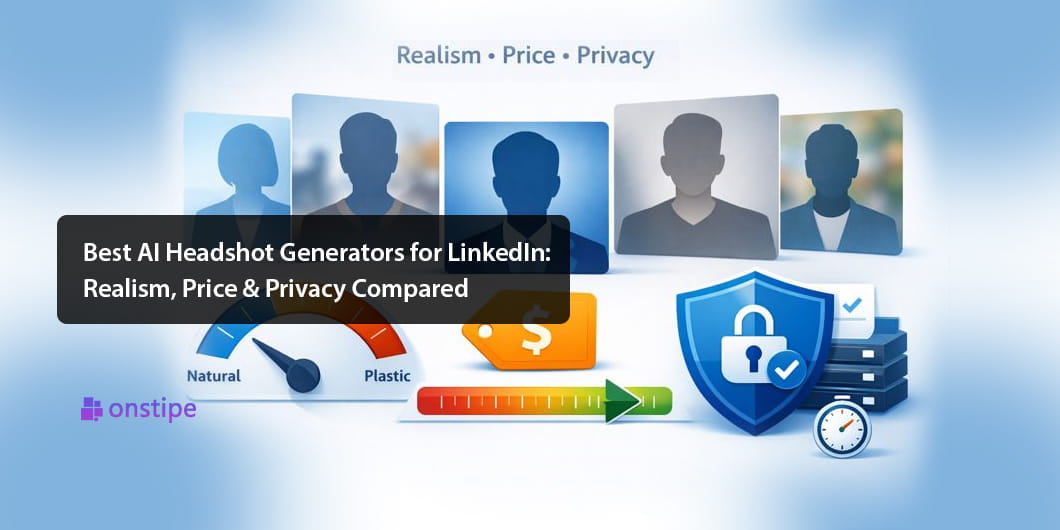If you’re running a small business, the phone never rings at a convenient time. It’s that split second when you’re with a client, knee-deep in paperwork, or driving between jobs. Let it go to voicemail, and chances are the caller has already moved on to the next option.
Hiring a full-time receptionist isn’t realistic for most small businesses. Between salary, benefits, and training, you’re looking at thousands every month. That’s why more owners are turning to AI receptionists—virtual systems that answer calls, capture leads, and even schedule appointments without you having to pick up.
In this guide, we’ll break down what to look for and compare the 10 best options available in 2025, with pricing, features, and real-world fit for different business types.
What to Look for in AI Receptionist Tools
Not every AI receptionist works the same way, and the wrong choice can leave you paying more than you’d spend on a part-time hire. Here are the factors that matter most for small businesses:
- 24/7 Coverage – Your phone doesn’t care about business hours. Look for tools that pick up every call, day or night.
- Call Handling & Summaries – Beyond answering, the best systems provide transcripts or summaries so you don’t waste time replaying voicemails.
- Custom Training – A good AI receptionist should sound like it works for your business. That means training it on your website, FAQs, or service list—not generic scripts.
- Integrations – If you’re juggling CRMs, scheduling tools, or Slack, choose a platform that pushes call data directly into your stack. Zapier support is a bonus since it connects to 1,000+ apps.
- Pricing Model – Some services bill by the minute or per call, while others offer flat monthly rates. Flat pricing is usually safer if your call volume is unpredictable.
- Language & Accessibility – Multilingual support matters if your customers aren’t all English speakers.
Keep these points in mind, and you’ll avoid overpaying for a tool that doesn’t actually fit how your business runs.
Rosie AI (Best Overall for SMBs)
For small business owners, Rosie AI hits the sweet spot: affordable, unlimited, and built to work straight out of the box. While most competitors either charge by the minute or lock features behind higher tiers, Rosie keeps it simple—$49 a month for unlimited calls, with no hidden costs.
Key Features
- 24/7 AI Answering – Handles every call, even late-night inquiries.
- Custom Training – Pulls info from your website, Google Business profile, or uploaded FAQs, so responses sound accurate and specific.
- Zapier Integration – Connects to 1,000+ apps for things like pushing leads into HubSpot, logging transcripts into Slack, or auto-updating Google Calendar.
- Spam Filtering – Flags robocalls so you don’t waste attention on junk.
- Bilingual Support – English and Spanish coverage, ideal for service areas with diverse customers.
Pricing
- Professional – $49/mo (unlimited calls).
- Scale – $149/mo (adds more advanced automation).
- Growth – $299/mo (multi-location + CRM depth).
- Custom – for larger enterprises.
For SMBs, Rosie’s biggest win is predictability: no per-minute surprises, no wasted calls, and setup you can finish before lunch.
Smith.ai (Good Hybrid Alternative)
Smith.ai takes a different approach from fully automated systems. Instead of relying solely on AI, it blends automation with a team of human receptionists. This hybrid setup means callers often get a more conversational experience—especially useful for businesses that need empathy and intake beyond yes/no answers.
Key Features
- 24/7 answering with both AI and live agents.
- Appointment scheduling and outbound call support.
- Lead qualification and intake forms tailored to your business.
- CRM integrations with tools like Salesforce, HubSpot, and Clio.
- US-based receptionists for businesses that value a personal touch.
Pricing
- AI only starts around $95/mo.
- Hybrid plans with humans answering calls begin near $140/mo and scale up based on call volume.
Smith.ai’s flexibility is strong, but for many SMBs the price difference is hard to ignore. Compared to Rosie’s $49 unlimited plan, Smith.ai’s structure often feels like overkill unless your calls truly require human nuance.
Aircall (Integration Heavy, But Expensive)
Aircall is best known as a cloud phone system for sales and support teams, but its newer AI Voice Agent adds receptionist-like capabilities. If you’re already running a SaaS-heavy tech stack, Aircall’s 200+ integrations make it appealing—think Salesforce, HubSpot, Slack, and Zendesk all tied directly into your call flow.
Key Features
- AI Voice Agent for automated call handling.
- Advanced call routing and IVR menus.
- Analytics dashboard with call insights.
- 200+ app integrations for sales and support teams.
- Mobile and desktop apps for remote teams.
Pricing
- Starts at $30 per user/month plus $0.99 per minute for AI calls.
- Extra costs for add-ons and premium integrations.
For small businesses that just need someone to answer the phone and book appointments, Aircall is overkill. The per-minute billing can spike costs if your call volume swings, making it less predictable than a flat-rate option.
JustCall (Global Language Support)
JustCall is a cloud phone system built for distributed teams, and its AI receptionist features lean heavily on multilingual support. If your customers span multiple countries or you run a bilingual service area, JustCall’s language capabilities are a major draw.
Key Features
- Multilingual AI answering across several languages.
- Mobile apps for iOS and Android—handy if your team is always on the move.
- Smart call routing and IVR options.
- Analytics and reporting to track call outcomes.
- Integrations with CRMs like Zoho, Pipedrive, and Salesforce.
Pricing
- Starts at $29 per user/month plus $0.99 per AI minute.
- Higher-tier plans add call monitoring and deeper integrations.
JustCall is affordable upfront, but the per-minute AI billing adds up fast. For businesses with unpredictable call volume, monthly costs can swing wildly.
RingCentral AI Receptionist (Suite Add-On)
RingCentral, long known for its business phone systems, launched its AI Receptionist in July 2025. Built with generative AI, it’s designed to route calls, answer FAQs, and connect seamlessly with RingCentral’s existing suite of communication tools.
Key Features
- Generative AI call answering and routing.
- Integrates natively with RingCentral’s phone, video, and messaging products.
- Customizable call flows and IVR menus.
- Analytics and reporting inside the RingCentral dashboard.
Pricing
RingCentral doesn’t publish standalone pricing for the AI receptionist. Instead, it’s bundled into certain RingCentral plans, typically starting around $30–$35 per user/month, with costs increasing as you add advanced AI features.
Use Case
If your business already relies on RingCentral for phones or UCaaS (Unified Communications as a Service), turning on the AI receptionist is a convenient add-on. It reduces the friction of juggling multiple vendors.
For small businesses not already using RingCentral, the setup and licensing fees don’t make sense. It’s tied to the broader platform, so you’re paying for features you may never use.
Zoom Virtual Agent
Zoom recently stepped into the AI receptionist space with its Virtual Agent, expanding beyond video calls into full customer communication. This tool is built for businesses that want a no-code setup and multilingual coverage out of the box.
Key Features
- Multilingual support for handling diverse customer bases.
- No-code setup that allows you to train the AI from documents, FAQs, or knowledge bases.
- Omnichannel communication—handles phone, chat, and web interactions.
- Native integration with Zoom’s UCaaS and contact center tools.
Pricing
Zoom hasn’t released flat public pricing yet, but reports suggest it’s bundled as an add-on to existing Zoom subscriptions, with AI agent plans starting around $70 per user/month.The downside is complexity. Zoom’s AI is geared toward larger organizations with multiple channels, not lean SMBs.
Goodcall
Goodcall positions itself as an AI receptionist with a focus on customization. It lets business owners tailor call flows more deeply than some competitors, which makes it appealing if your intake process is complex or highly specific.
Key Features
- Custom AI agents trained on your FAQs and scripts.
- 24/7 answering with natural-sounding voices.
- Appointment scheduling and lead capture.
- Integrations with popular scheduling and CRM tools.
- 14-day free trial to test the setup before committing.
Pricing
- Plans range from $59 to $199 per month depending on features and call volume.
- Pricing scales with add-ons, so costs can rise quickly for higher-demand businesses.
Dialzara
Dialzara is a lightweight AI receptionist tool designed for businesses that want basic call handling without a steep learning curve. Its appeal lies in simplicity—set it up quickly, and it starts answering calls right away.
Key Features
- Automated 24/7 call answering.
- Simple call routing and FAQ handling.
- Customizable scripts for common questions.
- Dashboard for tracking call activity.
- 7-day free trial to test functionality.
Pricing
- Plans range from $29 to $199 per month, scaling with features and call limits.
- Charges by usage, so higher call volume increases monthly costs.
Dialzara covers the basics but doesn’t go much further. It lacks integrations with broader tools like Zapier, which limits automation.
Synthflow
Synthflow takes aim at businesses that want enterprise-grade AI call automation. It’s built for scale, offering a wide range of pricing tiers that stretch from startup-friendly to full corporate deployments.
Key Features
- AI agents for call answering and routing.
- Advanced automation for complex workflows.
- Integrations with CRM and help desk platforms.
- Customizable voice personas for branding consistency.
- 14-day free trial across all plans.
Pricing
- Plans start at $29 per month and climb up to $1,400 per month for enterprise-level capabilities.
- Cost depends on minutes, features, and customization.
Use Case
A nationwide service provider with multiple offices might use Synthflow to manage high call volume across regions, routing calls intelligently to the right department.
The flexibility is powerful, but for most small businesses, Synthflow is too much. Managing complex automations requires more technical setup, and the higher-end plans cost more than hiring staff outright.
Abby Connect
Abby Connect blends AI call handling with live virtual receptionists, giving small businesses a way to test the waters without committing to heavy costs. Its standout feature is a low-volume free tier, making it appealing for startups or solopreneurs who only get a handful of calls each week.
Key Features
- AI receptionist with human backup options.
- Custom greetings and FAQ handling.
- Appointment scheduling and lead capture.
- Call summaries and voicemail transcription.
- Free tier for businesses with very light call needs.
Pricing
- Starts at $0 for up to 20 minutes per month.
- Paid plans scale up to $690 per month depending on minutes and features.
Comparison Table
Here’s a quick side-by-side view of the top AI receptionist tools so you can see how pricing, features, and best-fit scenarios stack up.

How to Choose the Right Tool
Picking the right AI receptionist comes down to three main factors: call volume, budget, and how much customization you actually need.
- If your call volume swings wildly: Avoid per-minute models like Aircall or JustCall. Those can spike costs overnight. Flat-rate pricing, like Rosie’s unlimited plan, is safer and easier to budget for.
- If empathy really matters: Some industries—law, healthcare, counseling—benefit from a human voice on the other end. In those cases, a hybrid like Smith.ai or Abby Connect might be worth the extra cost.
- If you’re already tied into a big suite: Zoom and RingCentral make sense only if you’re already paying for their platforms. Otherwise, you’re buying features you won’t touch.
- If you want automation beyond calls: Look for integrations. Rosie’s Zapier connection lets you push leads into CRMs, update calendars, or even fire off Slack alerts automatically.
For most small businesses, the math is simple: you need every call answered, you don’t want to overthink setup, and you can’t afford unpredictable bills. That’s exactly where Rosie shines. It’s not about stacking up every possible feature—it’s about picking the tool that quietly handles calls so you can focus on the work that actually makes you money.
Conclusion
For small businesses, every missed call is a missed customer. AI receptionists solve that by keeping your phone covered 24/7 without the payroll burden of a full-time hire.
Most tools on this list have trade-offs—per-minute costs, complex setups, or pricey hybrid models. Rosie AI avoids those pitfalls. With flat $49 unlimited pricing, setup in minutes, and integrations that feed leads straight into your CRM, it gives SMBs exactly what they need: predictable coverage and less admin work.







